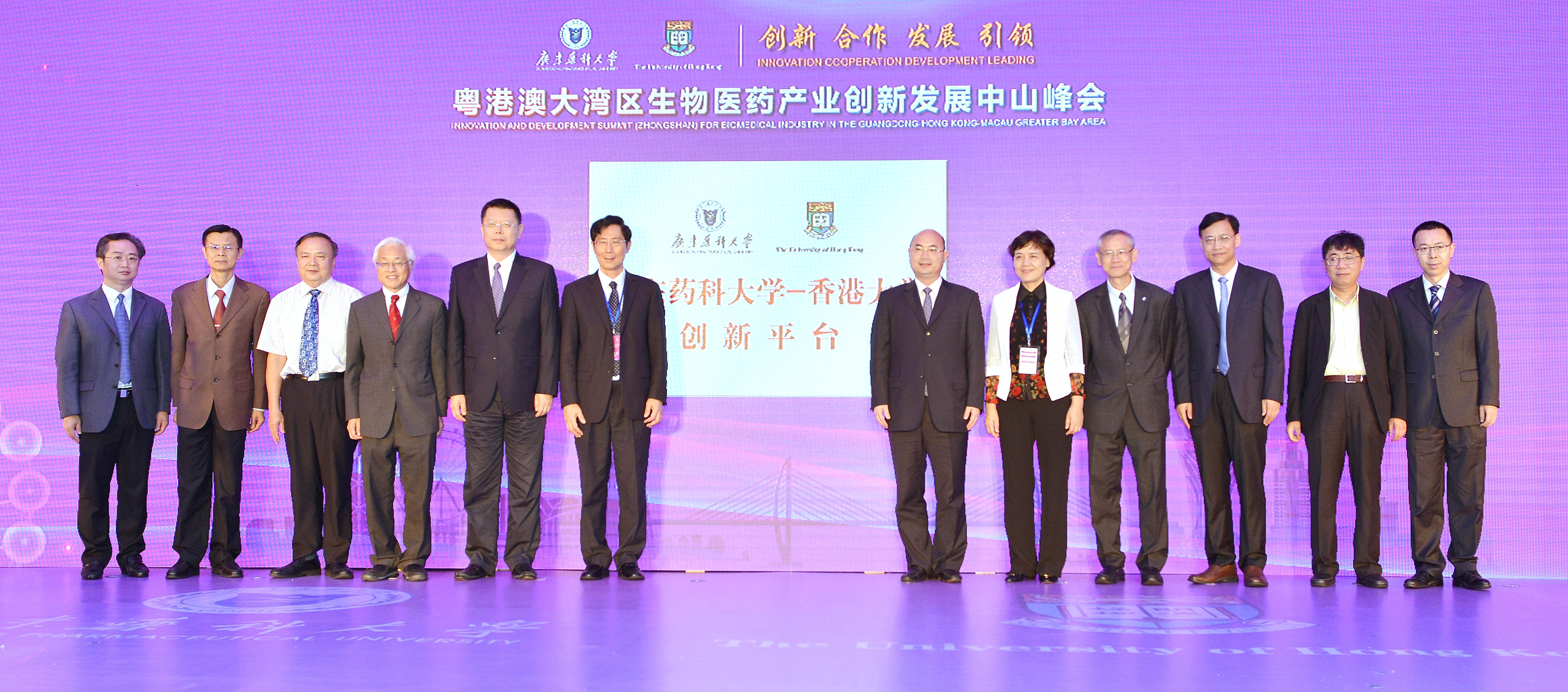
09 Jul 2018

The University of Hong Kong (HKU) and the Guangdong Pharmaceutical University (GDPU) has jointly launched the GDPU-HKU Innovations Platform (the Platform) in Zhongshan to collaborate on bio- and health technology and translational medical research and development in Guangdong-Zhuhai-Macau Greater Bay Area.
A Satellite Branch of HKU’s Partner State Key Laboratory of pharmaceutical biotechnology will also be set up at GDPU.
The move is of great strategic importance to HKU in terms of technology transfer and commercialisation of the University’s cutting-edge research particularly in the field of bio-medicine. It is also a significant step to mark the University’s presence and contribution to development in Greater Bay Area.
The Platform is to take part in and ride on the “Healthy China 2030” blueprint and other national strategic documents to delineate the development plan of bio-medicine in China, which will capacitate the growth of its medical health industry to RMB 8 trillion by 2020 and RMB 16 trillion by 2030.
With the support of the Zhongshan Municipal People’s Government, which has committed to growing its national medical base and bio-medical industry, the Platform will be playing a major role in the Greater Bay Area development, by leveraging on HKU’s technological innovations and cutting-edge research and by utilising GDPU's expertise in translational medicine development and in operating incubation facility. GDPU has built a wide industrial network in the area and steers the Guangdong-Hongkong-Macau pharmaceutical industry collaborative alliance which has nearly 200 members from enterprises, associations and educational institutes.
The platform is established at the “Torch High-Tech Industrial Zone”, a national health technology park supported by the Ministry of Science and Technology, and the People’s Governments of Guangdong and Zhongshan City. Three core units - Incubation Facility, joint-laboratory, and Technology Transfer Unit – will be set up. The target is to develop the Platform into a National level technology enterprise incubator hosting at least 50 spinoff companies and incubate at least 10 HKU technologies within 5 years.
A launching ceremony for the Platform was held on July 6 (Friday) in Zhongshan. HKU Acting President and Vice-Chancellor Professor Paul Tam, President of GDPU Professor Guo Jiao and Mayor of Zhongshan Government Mr Jiao Lansheng officiated at the ceremony.
Speaking at the ceremony, Professor Tam said the Platform has signified a new stage in the University’s effort to excel in research, innovation and technology.
He said: “The Platform has provided us with enormous opportunities. Not only opportunities for our researchers and students to exchange and collaborate with medical industry clusters in Zhongshan City and companies in Greater Bay Area, but also technology transfer and commercialisation opportunities of HKU inventions and know-hows on biotechnologies and medical research to local companies, which will allow us to better serve the community in the long run.”
It is expected that the Incubation Facility (the Incubator) set up under the Platform will develop into a municipal level technological enterprise incubator in Zhongshan in one to two years and a provincial level technological enterprise incubator in Guangdong Province in two to three years after, that is with 5 to 10 companies and 20 to 30 companies stationed in the Incubator respectively. The ultimate goal is for it to develop into a national level technological enterprise incubator in China five years after with more than 50 companies stationed.
The Technology Transfer Unit provides services to HKU researchers and GDPU researches in areas related to technology transfer and commercialising HKU’s IPs as well as GPDU’s translational research to industrial enterprises and technology companies in Zhongshan City and in the Greater Bay area.
The Joint-Laboratory, equipped with GMP (Good Manufacturing Practice) facilities, will provide space and laboratory facilities for researchers from HKU and GDPU to conduct joint-research projects.
